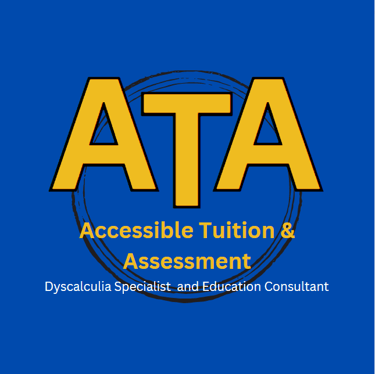For more information on SpLD Mathematics and dyscalculia assessments, tuition, mentoring or training email nichola.ata@gmail.com
Specialised Assessments
Expert evaluations for dyscalculia, DSA & Exam Access Arrangements




DSA (Disabled Student Allowance) Assessments
For learners starting university, DSA assessments can be conductified to identify strengths and weaknesses in maths learning/ dyscalculia as well as as challenges in attention & concentration or motor coordination difficulties.
Exam Access Arrangement Assessments
Comprehensive assessments designed to identify dyscalculia and provide tailored recommendations for educations, and workplace.
Assessments are governed by regulatory body SASC guidelines and can be used as evidence of need towards a DSA application or exam access arrangements.
Dyscalculia Assessments
Support for schools in assessing for exam access arrangements including completion of form 8's


FAQ's
For more information including pricing please email nichola.ata@gmail.com
If you/ your child is struggling in maths and you think there may be an underlying cause, a diagnostic assessment for dyscalculia may be of benefit. The assessment is detailed and utilises a variety of cognitive assessments along with informal tasks to determine the underlying reason for those difficulties.
The assessment and any diagnosis is based around the UK definition of Dyscalculia, and follows guidance from regulatory body SASC (2025).
"Features: A specific learning difficulty in mathematics is a set of processing difficulties that affects the acquisition of arithmetic and other areas of mathematics.
In dyscalculia, the most commonly observed cognitive impairment is a pronounced and persistent difficulty with numerical magnitude processing and understanding that presents in age related difficulties with naming, ordering and comparing physical quantities and numbers, estimating and place value.
Some individuals may not present with a specific cognitive impairment in numerical magnitude processing but have an equally debilitating specific learning difficulty (SpLD in mathematics) due to other processing difficulties. Difficulties in language, executive function (verbal and visuo-spatial working memory, inhibitory control) and visual-spatial processing may also contribute.
Impact: Mathematics is a very varied discipline. Difficulties with learning mathematics may present in specific areas (for example, basic calculation) or across of the mathematics studied by the individual in relation to age, standard teaching and instruction, and level of other attainments. Across education systems and age groups, difficulties in arithmetic fluency and flexibility and mathematical problem solving are key markers of a SpLD in mathematics. Persistent difficulties in mathematics can have a significant impact on life, learning and work. This may also have a detrimental impact upon an individual’s resilience to apply mathematical skills effectively.
Presentation: The presentation and developmental trajectory of a specific learning difficulty (SpLD) in mathematics depends on the interactions of multiple genetic and environmental influences. It will persist through life but may change in manifestation and severity at different stages.
A SpLD in mathematics frequently co-occurs with one or more of the following: attention deficit hyperactivity disorder (ADHD), dyslexia, developmental language disorder (DLD) and developmental coordination disorder (DCD).
Maths anxiety commonly co-occurs with a SpLD in mathematics but is not an indicator in itself." More details can be found here.
The assessment can be used to support any future application for Disabled Student Allowance (DSA).
Why have a full diagnostic assessment for Dyscalculia or Maths Difficulties?
What does an assessment involve?
The assessment uses a variety of approaches to look at underlying ability and maths difficulties. These include:
Standardised tests looking at cognitive abilities, maths and some literacy
multi-sensory activities using concrete materials
maths anxiety questionnaire
a detailed history of maths difficulties
discussion of current challenges
How long does an assessment take?
The assessment takes around four hours, sometimes a bit longer. The assessee can have breaks as required throughout when feeling tired.
What happens after the assessment?
All of the background information will be examined along with the scores and observations from the standardised tests. A detailed report will then be written containing the following:
diagnostic decision
summary of difficulties
recommendations for teaching and learning, exam support, personal life.
The report will take approximately three - four weeks to be written. The report will follow the format as stipulated by regulatory body SASC.


